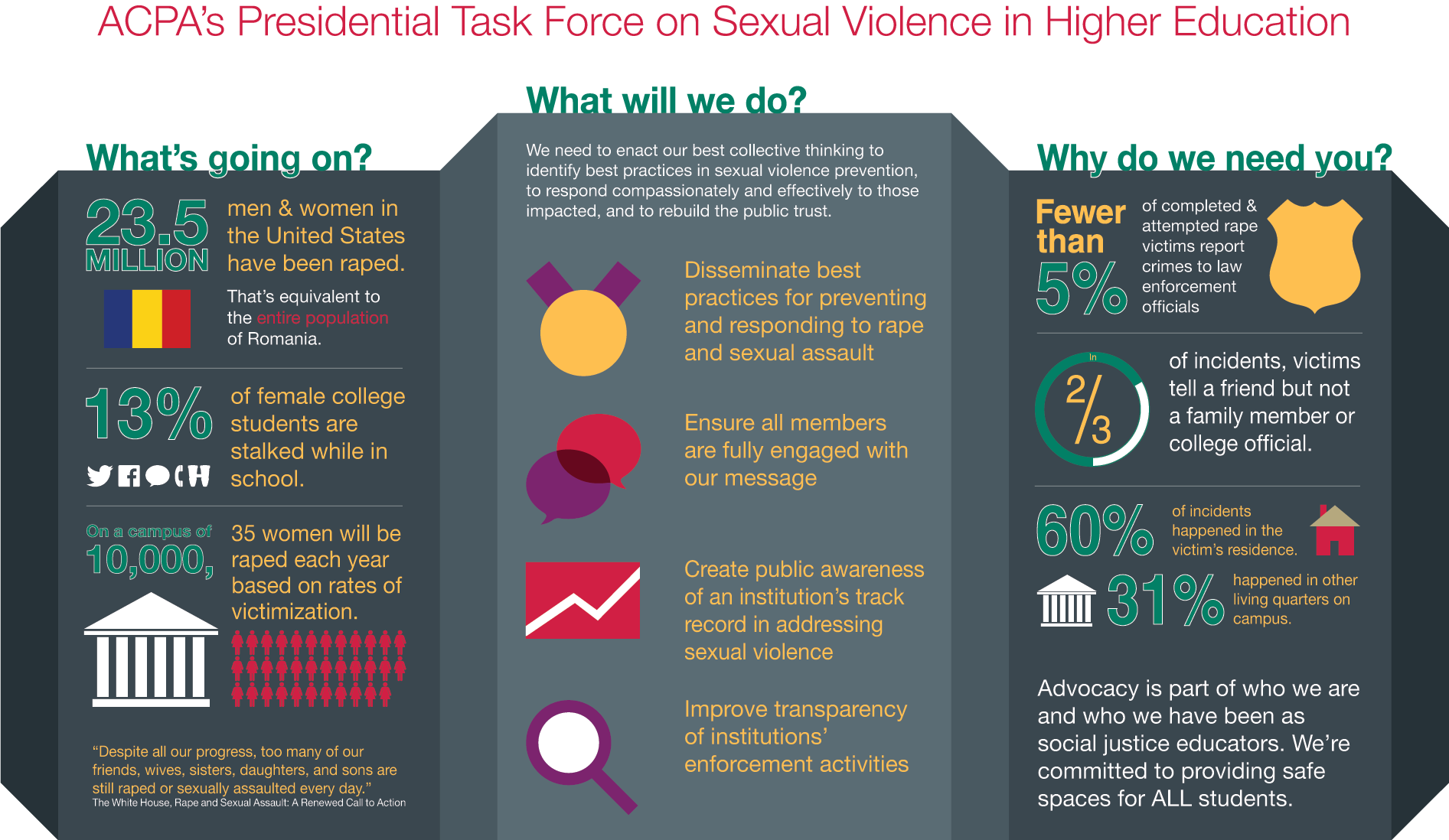Task Force on Sexual Violence in Higher Education
Friday, 25 April 2014 - 12:28pm
Background: Sexual violence, which includes harassment, stalking, assault, and rape, is a critical issue in higher education today. Media reports indicate that students, families, and the general public have “little to no faith” that administrators accurately or effectively handle issues of sexual violence on college campuses. Recently, the White House Council on Women and Girls released a report entitled Rape and Sexual Assault: A Renewed Call to Action and President Obama established a White House Task Force to Protect Students from Sexual Assault. In his memorandum to the heads of executive departments and agencies at the federal level, the President called attention to rates of rape and sexual assault on college campuses and issued a call to action. While he acknowledged that "schools have made progress in addressing sexual assault," President Obama made it clear that more needs to be done. To date, the higher education response to sexual violence has largely been at the campus level. It is clear that we also need a response as a professional community. As educators and social change agents, we need to enact out best collective thinking to identify best practices in sexual violence prevention, to respond compassionately and effectively to those impacted, and to rebuild the public trust.
Sources: Rape and Sexual Assault: A renewed call to action The Sexual Victimization of College Women
ACPA is the leading voice in scholarship and research concerning college students. As such, we have a responsibility to lead with an understanding of the complexities of sexual violence and comprehensive prevention strategies and responses to violence that demonstrate care and integrity. To this end:
- We need to ensure that our primary focus is on meeting the immediate needs of people impacted by violence while simultaneously providing leadership in developing an integrated approach that ensures cultural change towards its eradication.
- We need to collaborate with other associations, disciplines and movements to embrace a broader agenda that challenges the systemic injustices, cultural norms, attitudes and beliefs that are the root causes of violence against human beings.
- We need to engage our learning communities to make ending violence a top priority and support them to develop solutions that ensure all people are safe, valued and have agency.
- We need to develop an interdisciplinary and interconnected movement that has exponentially greater impact.
- We need to harness the current expertise in our field, and in other disciplines, for strategic collaboration, coordination and cooperation.
- We need to coordinate and build sustainable, collective leadership, recognizing value in shared and strategic leadership.
- We need to ensure that service-providers and advocates within government and higher education policy groups work in full partnership to achieve our long-term vision—the end of sexual violence and assault on our campuses.
- We need to synthesize existing research on interventions that are and are not effective, promulgating individual-based and environmental strategies for which evidence of efficacy exists or lead where such evidence does exist.
Charge: The Presidential Task Force on Sexual Violence in Higher Education will make recommendations to the ACPA Governing Board about the Association's critical role in responding to issues of sexual assault on college campuses. More specifically, the task force will:
- evaluate existing efforts of ACPA constituency groups to identify areas for new focus and opportunity,
- recommend organizational structure(s) in ACPA that ensure a welcoming and productive home for higher education professionals working to effectively address sexual assault issues on college campuses,
- define ACPA’s role in addressing sexual assault on college campuses, including providing resources that include cutting edge scholarship and research-informed best practices,
- identify new ideas and resources for ACPA members engaged in this work utilizing models congruent with ACPA’s commitment to social justice and the elimination of oppression and the root causes of violence, and
- recommend strategies to create networks and communities for sharing best practices, disseminating knowledge, and fostering collaborations on campus sexual assault.
Relationship to ACPA’s Mission: Persistent high rates of sexual violence have plagued many campuses for too long. As a profession, we are charged with fostering and supporting student learning and success. Sexual violence is an affront to human dignity and degrades safe campus learning environments for all. ACPA is committed to promoting student welfare, campus safety, and addressing issues of oppression which underline sexual violence.
Open Call for ACPA member involvement: The ACPA Governing Board seeks nominations, including self-nominations, to serve on ACPA’s Presidential Task Force on Sexual Violence in Higher Education.
Thank you for your interest in the ACPA Presidential Task Force on Sexual Violence in Higher Education. The submission deadline has passed.
The deadline for nominations/self-nominations is 5:00pm ET, Monday, May 5, 2014. The ACPA Governing Board is seeking individuals with interest, experience, and expertise in the arena of sexual assault education and who are willing to serve on this task force. A selection committee comprised of Governing Board and Assembly leaders will review applications and select individuals, who as a group provide a diversity of experience, skill, and knowledge. Selections will be recommended to the ACPA Governing Board on May 9, 2014 and notifications will go out the week of May 12, 2014.

